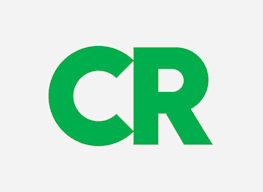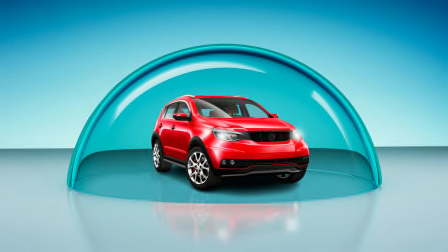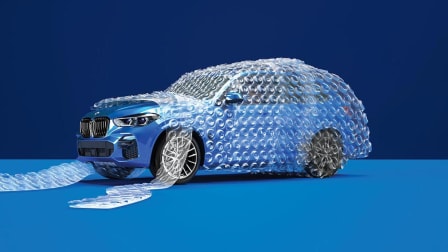When Buying Car Insurance, Bigger Isn't Better
The biggest advertisers rank middling or lower in CR's latest car insurance ratings, and USAA is tops on all counts

Big car insurers like Geico, Progressive, and Allstate may be the most recognizable, but it’s their lesser-known competitors that consistently earn higher satisfaction scores in CR’s latest member survey about car insurance.
In fact, of the four insurers in the highest category of Consumer Reports’ car insurance ratings, not one is among the top spenders on auto-insurance advertising. What’s more, more than a dozen other insurance companies rate higher than any of the big players.
USAA, NJM, Amica, and Erie cap CR’s ratings of 36 car insurance companies. All four insurers earned very favorable scores from Consumer Reports members.
San Antonio-based USAA, however, was the only insurer with superlative scores across all ratings categories. Those categories include price paid for premiums; claims settlements; non-claims customer service; proactive attempts by the insurer to provide help and advice to customers; the thoroughness insurers provide their customers regarding their policy options; breadth of coverage; and clarity of a policy’s contract.
3 of the 4 Top Brands Limit Eligibility
USAA was alone in earning top marks for how thoroughly and clearly it presented its policy options to consumers, according to Consumer Reports members who responded to a survey we conducted last summer. In that survey, 40,251 CR members provided us with 47,713 reports on their experiences with car insurance companies. (CR members are not necessarily representative of the U.S. population.)
Very Good Alternatives Are Available
For consumers who can’t get coverage from the fabulous four, our ratings highlight lots of worthwhile alternatives—and most aren’t the big names you might think of. Fifteen companies earned overall scores that landed them in our next-best "favorable" ratings tier.
In addition to a few bigger names like State Farm and American Family, the cum laude list includes large carrier Cincinnati Insurance Company, which sells auto coverage in 45 states and D.C.; regional insurers such as PEMCO and West Bend; insurers that limit eligibility, such as members-only Auto Club Group (which provides insurance to AAA members in numerous states), and California Casualty (covering educators, nursing professionals and first responders, among others).
Major Advertisers Rated Middling or Lower
Geico, the car insurer that spends the most money on advertising, sits among 15 insurers in the midrange tier of CR’s ratings. In fact, most of the 10 largest insurance groups in the country—including big advertisers Progressive and Allstate—got this passable overall grade from our members.
Liberty Mutual, another major auto insurer, joins Kemper at the bottom of CR’s ratings, with a less-than-stellar overall score that puts them in our "unfavorable" ratings tier.
Allstate, Kemper, and Liberty Mutual all earned the lowest grade available, "very unfavorable," for premium pricing.
"More frequent, severe accidents and inflation-juiced repair prices are causing auto insurance rates to rise," said Allstate spokesperson Billy Miller. "Despite this, customers continue to get competitive prices with Allstate and can save money with Drivewise and Milewise based on their driving," referring to telematics programs that monitor customers’ driving style.
Barbara Ciesemier, a Kemper spokesperson, said, "We are primarily a specialty auto insurer catering to the unique needs of underserved markets that other carriers often avoid. We listen to our customers and agents to understand their product and service expectations, and are focused on delivering on the promises of our policies."
Price a Big Factor in Switches
According to a separate, national survey of more than 11,500 adults in the U.S. conducted by Ipsos for CR between August and September 2022, price was by far the biggest motivator when consumers switched carriers.
Among the 28 percent of drivers who moved to a new car insurer in the last five years, 58 percent said that one of the reasons they did so was because they got a better rate from their new carrier. Thirty-seven percent said they switched at least in part because their prior insurer raised premiums. (The survey allowed respondents to list multiple reasons.)
Although premium pricing was also a major incentive for younger drivers to switch, drivers younger than 60 were more likely that older drivers to have switched for reasons that extend beyond price. They were more likely to say their previous insurer offered a bad claims experience or wasn’t responsive about non-claims-related issues, and more likely to jump to a new insurer based on recommendations from family and friends.
Drivers were particularly likely to say they switched to Geico because they got better rates, the survey found.
But advertising gimmicks like the Geico Gecko, Progressive’s Flo, the LiMu Emu, and the Farmers Insurance Hall of Claims had relatively little impact on why members switched. Only 8 percent of respondents said that advertising made them look into switching insurers.
Missed Opportunities to Save Money
Though the majority of people who moved to a new carrier said they got better rates, the Ipsos/CR survey found that few of these people bothered to shop around. Just 15 percent of drivers who switched insurers in the previous five years said they regularly shop around to get the best deal. In fact, more than a quarter of drivers have been with their current company for 15 years or more.
But shopping regularly—as often as once a year—can save you money. To save money on coverage, CR recommends:
• Set the deductible right. A higher deductible reduces your premium because you pay more out of pocket if you have a claim. If you have a good driving record and haven’t had an at-fault accident in years—or ever—opting for a higher deductible on collision might be a good bet. Just make sure you can afford to pay it if your luck runs out.
• Bundle your car and homeowners coverages. Insuring your home and car with the same company can save you on one or both coverages, says the Insurance Information Institute, an industry organization.
• Make sure you get available discounts. Ask about breaks, including those for safety- and security-related features built into your car, good student drivers (typically, a B average or better at school), low daily mileage, and completion of a safe-driver training. All can reduce your premium.
• Maintain a good credit score. Many car insurers use credit-based insurance scores to help set your car insurance premiums, a practice CR has advocated against. However, most states allow this practice, which critics say unfairly punish people for factors unrelated to their driving. In general, lower scores produce higher premiums, though the impact varies from insurer to insurer. (Several states, including California, Hawaii, Maryland, Massachusetts, Oregon Utah, and Washington, either prohibit or restrict the use of credit-based insurance scores.)
• Check the other factors your insurer considers. In many cases, your job title or education level can also factor into the price you pay for car insurance, potentially raising premiums for those who can least afford it. California and Massachusetts don’t allow insurers to consider your work or education, and many insurers have stopped doing so in New York as well. But if you live elsewhere and you don’t have a college degree or a high-ranking job, consider shopping around at smaller insurers like CURE and Root (which CR doesn’t rate). Both companies commit to leaving your job and education out of their pricing; CURE doesn’t use credit score, either, and Root says it will stop using credit scores by 2025.





















